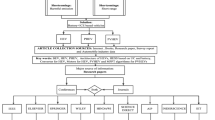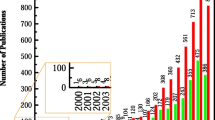The paper presents the authors’ method for evaluating the efficiency of and selecting equipment and operating conditions for renewable and conventional power systems located in the Arctic region of Russia. The use of renewable energy sources and the creation of wind/diesel power systems may be an effective solution for reducing fuel consumption and electricity generation by diesel power plants. This would improve the energy and environmental security of consumers, especially in zones of high wind power potential. The method allows energy and economic optimization of renewable power systems in the extreme climatic conditions of the Arctic region of Russia.
Similar content being viewed by others
References
V. V. Elistratov, Renewable Power Generation [in Russian], Nauka, St. Petersburg (2013).
Wind Energy Projects in Cold Climates. Expert Group Study on Recommended Practices, The International Energy Agency Program for Research, Development and Deployment on Wind Energy Conversion Systems, May (2012).
H. Seifert, Technical Requirements for Rotor Blades Operating in Cold Climate, BOREAS VI, FMI, Pyhqtunturi, Finland (2003).
P. S. Denisov and V. V. Elistratov, “A method for selecting power-generating equipment of wind power plants,” in: Proc. Int. Sci.-Pract. Conf. XLII Week of Science at SPbPU (December 27, 2013) [in Russian], Izd. Politekhn. Univ., St. Petersburg (2013).
V. V. Elistratov, M. Knežević, M. A. Konishchev, and M. Konishchev, “Problems of constructing wind-diesel power plants in harsh climatic conditions,” J. Appl. Eng. Sci., 12(1), 29 – 36 (2014).
V. Elisrtratov, I. Kudryasheva, and P. Pilipets, “Energy efficient solutions of power supply in north regions,” Appl. Mech. Mater., 725 – 726, 1463 – 1469 (2015).
Recommended Practice for the Evaluation of the Efficiency of Investment Projects [in Russian], Ékonomika, Moscow (2000).
G. I. Sidorenko, I. G. Kudryasheva, and V. I. Pimenov, Economics of Nonconventional and Renewable Power Units: Feasibility Study [in Russian], Izd. Politekhn. Univ., St. Petersburg (2008).
R. Hunter and G. Elliot, Wind-Diesel Systems: A Guide to the Technology and Its Implementation, Cambridge Univ. Press, New York (1994).
E. S. Raghav Chakravarthy, A. Bhargavi, K. Parkavi Kathirvelu, and R. Balasubramanian, “Analysis and simulation of isolated wind diesel hybrid power system,” ARPN J. Eng. Appl. Sci., 9(7), 1056 – 1063 (2014).
The Outlook for Renewable Energy in America, American Council on Renewable Energy (ACORE) (2014).
J. A. Frye, Performance-Objective Design of a Wind-Diesel Hybrid Energy System for Scott Base, Antarctica. A Master of Engineering Thesis, University of Canterbury, New Zealand (2006).
H. R. Hooshangi, “Feasibility study of wind-diesel hybrid power system for remote communities in north of Quebec,” J. Adv. Clean Energy, 1.1, 84 – 95 (2014).
Author information
Authors and Affiliations
Corresponding author
Additional information
1 This study was sponsored by the Ministry of Education and Science of the Russian Federation, agreement No. 14.577.21.0066, Unique Identifier RFMEFI57714X0066
Translated from Élektricheskie Stantsii, No. 10, October 2015, pp. 38 – 42.
Rights and permissions
About this article
Cite this article
Elistratov, V.V., Kudryasheva, I.G. Principles of an Integrated Approach to Determining the Efficiency of Stand-Alone Wind/Diesel Power Systems1 . Power Technol Eng 49, 464–467 (2016). https://doi.org/10.1007/s10749-016-0647-1
Published:
Issue Date:
DOI: https://doi.org/10.1007/s10749-016-0647-1




